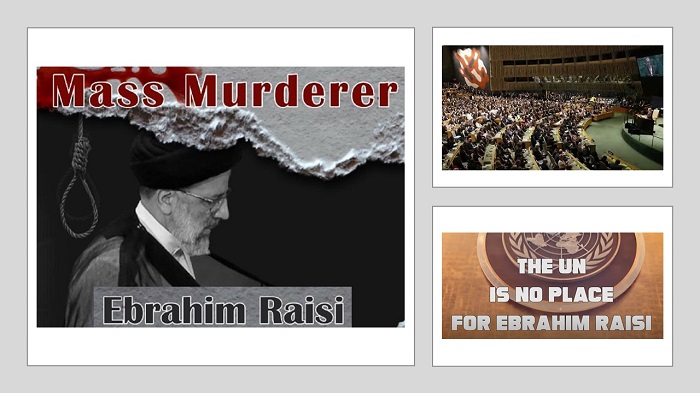
The National Council of Resistance of Iran (NCRI) reported recently that as Iranian President Ebrahim Raisi is due to address the United Nations General Assembly on September 20, calls have continued to mount for his prosecution for his crimes against humanity and for the international community to ban him from conducting state visits.
The NCRI said, “…his remarks will supposedly deal with themes of justice and freedom — terms that are far removed from the daily experience of Iranian citizens and the core identity of Iran’s regime.”
Raisi’s new administration features many officers affiliated with the Islamic Revolutionary Guard Corps (IRGC), as well as many officers who are currently sanctioned by both the United States and the European Union.
Raisi, himself, is under a sanction from the US which has been in effect since 2019. While there is no warrant out for his arrest, the reasoning behind his sanction means he is legally eligible for arrest in every country in the world. This was highlighted last month in a virtual conference, hosted by the NCRI, to discuss the 1988 massacre in Iran. In attendance were many human rights and international law experts, along with 1,000 survivors of the massacre.
In the summer of 1988, Raisi was part of a ‘death commission’, which was tasked with executing 30,000 political prisoners, many of whom were supporters of the People’s Mojahedin Organization of Iran (PMOI/MEK), under the orders of then-Supreme Leader Ruhollah Khomeini.
The NCRI said, “The conference focused on the role that Raisi played in those killings. For the families of victims, for other Iranian regime officials, and for the Resistance Movement working to overturn the system that has supported the massacre’s perpetrators for more than three decades, Raisi’s prosecution would be a powerful sign that the regime’s impunity in such matters is finally at an end.”
The Iranian people have stood up against the regime in recent years and have organized many protests. Beginning at the end of 2017, protests escalated into a nationwide uprising that reached over 100 cities and towns in Iran by the middle of January the following year. The uprising in 2019 was on a much larger scale, spreading across nearly 200 cities and towns. In each demonstration, the protesters echoed similar anti-regime slogans, calling for regime change and ‘death to the dictator’.
The NCRI said, “The Iranian regime brutally suppressed these protests and Raisi played a key role in this oppression as he was in charge of the regime’s judiciary at the time of the mass shootings, indiscriminate arrests, and systematic torture.”
An open letter was addressed to the regime last year, written by seven United Nations human rights experts, which noted that the UN originally had an opportunity to demand accountability for the massacre at the end of 1988, just months after the atrocities had taken place. However, despite the knowledge of the massacre, no follow up investigations were ever conducted any UN body. The UN’s inaction at the time allowed the regime to enjoy a sense of impunity, and further inaction over the years has only supported that impunity.
The NCRI said, “Raisi’s presence at the UN General Assembly will be the greatest affirmation of that impunity to date. In allowing him to speak, the international community will be turning a blind eye to three decades of accumulated knowledge about the massacre and Raisi’s role in it.”